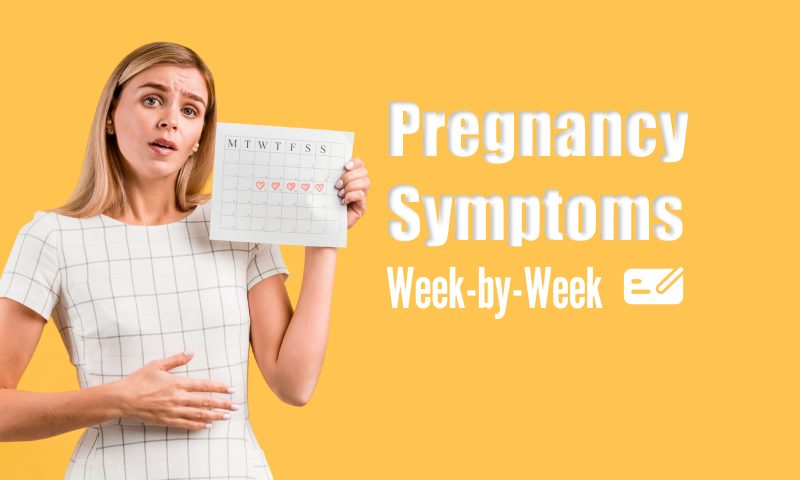Introduction
For many women, starting the amazing journey of pregnancy is a transforming period. Throughout the 40 weeks of pregnancy, a range of symptoms are likely to appear. As the body goes through several changes to support and nourish a developing life. The unique pregnancy symptoms week by week will get covered in this post.
Understanding pregnancy symptoms week by week
Pregnancy signs and symptoms vary each week from the starting of pregnancy till birth of child. Let’s cover symptoms of pregnancy Week by Week in sequential order:
1st week – 4th week
In the early stages of pregnancy, a lot of women might not even realize they are pregnant. Around the end of the second week is usually when conception happens. And the fertilized egg implants in the uterus during the fourth week. Symptoms are usually mild at this point, and any discernible changes could be the result of something other than pregnancy.
A like blog – Know The Top Tips For Getting Pregnant
5th week – 8th week
It is from 5th week that early pregnancy symptoms week by week start becoming more noticeable. Some women may start to detect minor changes as the pregnancy goes on. During this time, common symptoms include:
Missed Period: Missing a menstrual period is one of the first signs of pregnancy.
Morning Sickness: Usually starting around the sixth week, morning sickness is a condition marked by nausea and vomiting.
Breast Changes: As hormonal changes take effect to help the growing embryo, tender and swollen breasts are common.
Fatigue: Feelings of exhaustion and fatigue may come because of elevated progesterone levels.
9th week – 12th week
Throughout the first trimester, the body keeps adjusting to the expanding pregnancy. Symptoms might get worse and new indicators could appear:
Increased Urination: As the uterus grows, the bladder is compressed, which results in more frequent bathroom visits.
Food Aversions and desires: During this period, there may be changes in your taste preferences and desires.
Mood Swings: Emotional and mood swings can happen by changes in hormone levels.
Visible Veins: Some women may observe that their veins are becoming more noticeable, especially in the breasts.

13th week – 16th week
Many women find relief from the more difficult symptoms of early pregnancy as the second trimester approaches. New signs and modifications which are seen include:
Glowing Skin: Known as the “pregnancy glow,” an increase in blood flow can give the skin a radiant appearance.
Reduced Morning Sickness: In many cases, morning sickness goes away in the second trimester of pregnancy.
Visible Bump: As the uterus grows, the baby bump becomes more apparent.
Increased Energy: During this trimester, a lot of women report feeling more energetic.
17st week – 20th week
Pregnancy’s halfway point is a time of excitement and success. During this phase, new symptoms appear which include:
Quickening: Around the 18th or 20th week, some women experience the baby’s first movements, also referred to as quickening.
Backache: Postural changes and the expanding uterus can also cause back pain.
Linea Nigra: A black stripe that extends from the navel to the pubic region may show up on the abdomen.
Breathlessness: Breathlessness can result from pressure on the diaphragm.
21st week – 24th week
Expectant mothers may experience the following symptoms as the baby grows:
Braxton Hicks Contractions: Practice contractions, sometimes referred to as Braxton Hicks contractions, can happen.
Swelling: Mild swelling in the feet and ankles is possible for some women.
Blurry Vision: Hormonal fluctuations have the potential to cause temporary blurriness in vision.
Increased Hunger: As a baby grows, their nutritional needs also increase, which causes an increase in appetite.
25th week – 28th week
The last stage of pregnancy begins with the start of the third trimester, which is marked by certain symptoms:
Pelvic Pain: Discomfort may be brought on by pressure on the joints and pelvic.
Sleep disturbances: Its’ difficult to find a comfortable sleeping position.
Stretch Marks: When the skin stretches, stretch marks may appear.
Heartburn: Indigestion and heartburn can come on by an increase in stomach pressure.
29th week – 32nd week
Women who are pregnant may experience the following symptoms as the due date comes close:
Frequent Urination: As the pressure on the bladder increases, urine occurs more frequently.
Nesting Instinct: The strong desire to start making nests in anticipation of the baby’s arrival.
Swollen Feet and Ankles: Elevated fluid retention may cause swelling in the lower limbs.
Breathlessness: As a baby becomes bigger, its lungs have less room to expand, which results in breathing difficulties.
33rd week – 36th week
There is a mixture of excitement and expectation in pregnancy symptoms week by week during last few weeks of pregnancy. Among the symptoms are:
Braxton Hicks Contractions Intensify: Practice contractions may become more obvious and frequent
Fatigue: Putting on more weight may make you feel more exhausted.
Pelvic Pressure: As the baby falls into the pelvis, pressure inside the pelvis increases.
Vaginal Discharge: As the body gets ready for delivery, vaginal discharge typically increases.
37th week – 40th week
The body gets ready for labor as the time for delivery comes near, and symptoms could include:
Mucus Plug Discharge: The absence of the mucus plug, which indicates the start of labor.
Increased Backache: As the baby descends, more pressure is placed on the lower back.
Contractions: Real labor contractions get closer together, more frequent, and more powerful.
Breaking of the Water: The breakdown of the amniotic sac can indicate the start of labor.
A like blog – Best Pregnancy Belly Band For A Pain-Free Pregnancy
Conclusion
For every woman, the pregnancy journey is a unique and amazing experience. Although this guide offers a broad summary of pregnancy symptoms week by week. It’s critical to seek the guidance and specialized advice of a healthcare professional if questions or unexpected symptoms appear. The joyful arrival of a new life at the end of the body’s amazing changes makes the entire trip worthy.
Frequently asked questions
Q1: What week do most pregnancy symptoms start?
Ans: By the fifth or sixth week of pregnancy, the majority of women started to experience symptoms.
Q2: Which week is safe for delivery?
Ans: 39 weeks minimum. Compared to those born later, prematurely born infants may have more health issues both at birth and in the future. A 39-week pregnancy gives the developing baby’s body all the time it needs to grow. Your kid needs 39 weeks in the womb as vital organs like the brain, lungs, and liver need time to develop.

